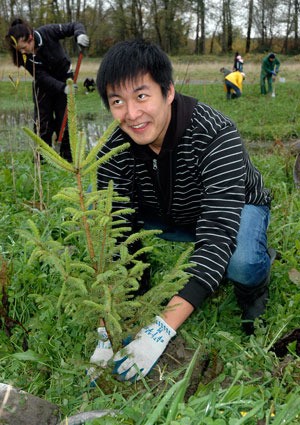ARLINGTON — Arlington’s stormwater treatment system now has the equivalent of a kidney, according to city Natural Resources Manager Bill Blake.
“We’re looking at having a total of 1,500 trees and shrubs here,” Blake said at the city’s new stormwater wetland. “The Douglas Fir, Red Cedar and Sitka Spruce trees will shade the third cell of our stormwater wetland to cool it down, as well as provide a vegetative buffer between the wetland and Highway 530.”
While the wetland at the north end of town near the Stillaguamish River is also intended to provide a breeding habitat for wildlife and a public trail system for human visitors, its four cells are an extension of the city’s wastewater treatment plant to the immediate east by Haller Park. Blake explained that the sequence is designed to help clear out garbage and sediment, before filtering out pollutants such as oils, pet waste, heavy metals and antibiotics, with the final stage being a babbling brook of cobbles that deoxygenates the water. Before that last cell in the circuit is the forested area.
“We’ve been counting the days until the first duck shows up,” Blake said. “We’re doing scientific analyses on when birds, mammals, amphibians and insects show up.”
To that end, more than 90 volunteers signed on to plant 500 of those native trees and shrubs at the stormwater wetland as part of a joint venture between the city of Arlington and Sound Salmon Solutions.
“This is a really great event,” Sound Salmon Solutions Volunteer Coordinator Michele Harmeling said on Nov. 12, as Scouts and members the Everett and Edmonds community colleges turned out alongside local residents, in spite of the morning’s cold, wet weather. “The whole community came together for this. The city provided the site, the plants and the food for the volunteers, and Sound Salmon Solutions coordinated their efforts.”
Harmeling echoed Blake’s praise for the stormwater wetland as a natural filtration system for substances that we flush down the toilet or pour down the sink.
“When you toss medication down the drain, it ends up in the Sound,” Harmeling said. “The hormones in contraceptives can interfere with animals’ reproduction.”
“Water can run completely through this system within six hours, even after a heavy rain,” Blake added.
Arlington resident Kristen Crakes brought her daughter to help her plant trees, and appreciates seeing her get into environmental stewardship at an early age.
“We like to do things as a family,” Crakes said. “We used to do cleanups like this back in Oregon, before we moved here about a year ago. It’s just fun to participate in, especially when it has a huge turnout like today.”
“I want my girls to learn about the environment and to feel good about giving to the community,” said Arlington Girl Scout Troop Leader Elise Simbeck, who was joined by 10 girls from her troop. “It can instill in them a lifelong belief in the value of service. I wasn’t even aware of this area before today. It’s fascinating.”







